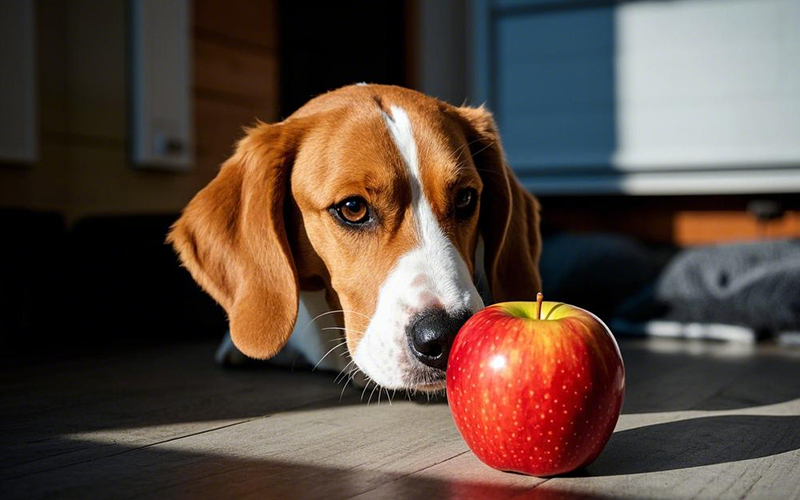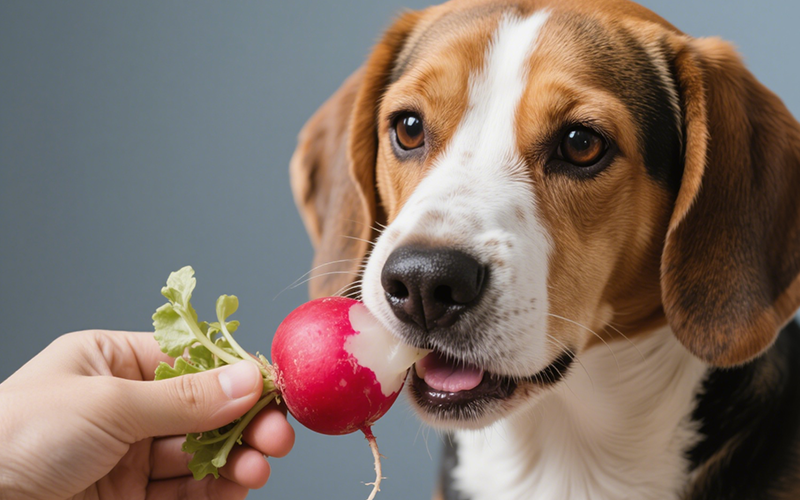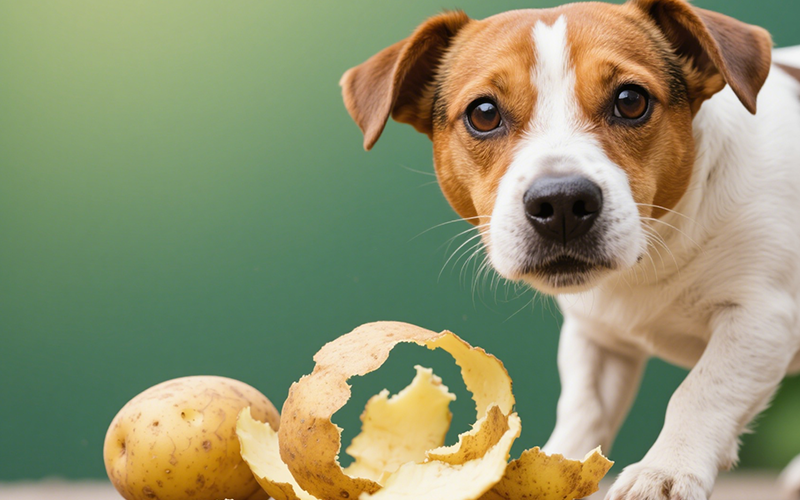Can Dogs Eat Apples? A Guide to Feeding Apples to Your Dog
- 4 Mar 2025 10:08
Apples are a popular fruit among humans, but many dog owners wonder: Can dogs eat apples? The good news is yes, dogs can safely eat apples! This fruit is not only delicious but also provides several health benefits for your furry friend. However, there are some important guidelines to follow when feeding apples to dogs to ensure they remain safe and healthy.
In this article, we’ll discuss whether apples are good for dogs, their benefits, potential risks, and the best ways to serve apples to your pup.

Are Apples Safe for Dogs?
✅ Yes, Apples Are Safe for Dogs
Apples are a great, low-calorie snack for dogs. They contain essential vitamins and minerals that support overall health. However, certain parts of the apple, like the seeds and core, can be harmful and should always be removed before feeding apples to your dog.
❌ Things to Watch Out for When Feeding Apples to Dogs
While apples are safe for dogs, there are a few things to keep in mind:
Remove the Seeds and Core – Apple seeds contain small amounts of cyanide, which can be harmful in large quantities. The core is also a choking hazard, especially for small dogs.
Feed in Moderation – Although apples are healthy, they contain natural sugars, which can contribute to weight gain or digestive issues if eaten in excess.
Avoid Apple Stems – The stem of an apple can be tough to digest and may cause stomach discomfort.
Watch for Allergic Reactions – While rare, some dogs may have allergies to apples. If it’s your dog’s first time eating apples, start with a small piece and observe for any signs of allergies, such as itching, vomiting, or diarrhea.
Health Benefits of Apples for Dogs
When fed in moderation, apples offer several health benefits for dogs, including:
1. Rich in Vitamins
Apples contain vitamin A, which supports eye health, and vitamin C, which helps boost the immune system and promote overall wellness.
2. Good Source of Fiber
Apples are high in dietary fiber, which aids digestion and helps maintain a healthy gut. Fiber can be especially beneficial for dogs with constipation or irregular bowel movements.
3. Supports Dental Health
Chewing on apple slices can help clean a dog’s teeth and freshen their breath naturally. The texture of apples helps remove plaque and tartar buildup.
4. Low in Calories
Apples are a low-calorie snack, making them an excellent treat for dogs who need to maintain a healthy weight.
5. Provides Hydration
Apples have a high water content, which helps keep your dog hydrated, especially on hot days.
How to Safely Feed Apples to Your Dog
If you want to include apples in your dog’s diet, follow these guidelines to keep them safe and healthy:
Wash the Apple Thoroughly
Apples may have pesticide residues on their skin, so wash them properly before serving them to your dog.
Remove the Core and Seeds
Cut the apple into slices and remove the core and seeds to prevent choking hazards and toxic exposure.
Cut into Bite-Sized Pieces
Depending on your dog’s size, chop the apple into small, manageable pieces to prevent choking.
Serve in Moderation
A few apple slices make a great treat, but don’t overfeed, especially for dogs with diabetes or sensitive stomachs due to the fruit’s sugar content.
Try Freezing Apples
Frozen apple slices can be a refreshing summer treat for your dog.
Mix with Other Foods
You can mix apple slices with peanut butter (xylitol-free), yogurt, or blend them into homemade dog treats.
Can Dogs Eat Apple Peels?
Yes, dogs can eat apple peels. The skin contains fiber and nutrients, but too much of it may cause digestive discomfort in some dogs, leading to gas or diarrhea. If your dog has a sensitive stomach, consider peeling the apple before serving.
Can Puppies Eat Apples?
Yes, puppies can eat apples, but introduce them slowly. Since their digestive systems are still developing, start with small amounts and watch for any signs of stomach upset. Make sure the apple is soft and cut into tiny pieces to avoid choking.
Can Dogs Eat Apple-Flavored Foods?
While fresh apples are safe for dogs, processed apple products may not be.
🚫 Avoid feeding your dog:
Apple Pie – Contains sugar, butter, and spices that can be harmful to dogs.
Apple Juice – High in sugar and may contain preservatives.
Apple-flavored Candies – Often contain artificial sweeteners like xylitol, which is highly toxic to dogs.
Stick to fresh apples to ensure your dog gets the best nutritional benefits without harmful additives.
Alternatives to Apples for Dogs
If your dog enjoys apples, you can also try these other safe and healthy fruits:
Bananas – A great source of potassium and fiber.
Blueberries – Packed with antioxidants and low in calories.
Strawberries – High in vitamin C and fiber.
Watermelon – Hydrating and refreshing (remove seeds and rind).
Pumpkin – Excellent for digestive health and rich in fiber.
Conclusion: Can Dogs Eat Apples?
✅ Yes, dogs can safely eat apples as a healthy treat in moderation. They provide vitamins, fiber, and hydration, making them a great low-calorie snack. However, always remove the seeds and core before feeding apples to your dog.
⚠ Remember: Feed apples in moderation to avoid digestive upset, and avoid processed apple products that contain sugar, artificial sweeteners, or harmful ingredients.
💡 Need help managing your dog’s diet or health? Try PettureX, an AI-powered pet health assistant that provides 24/7 online consultations and pet image recognition to help you determine safe foods for your dog and get real-time health advice.
If you have more questions about your dog’s diet or nutrition, feel free to ask! 🐶🍏
Related

Radish Bites for Your Buddy? A Vet-Reviewed Guide on Whether Dogs Can Eat Radishes
- 22 Apr 2025
Potato Peels for Pooches? Unpeeling the Risks and Facts for Dog Owners
- 22 Apr 2025
Crunchy Curiosity: Can Dogs Safely Snack on Pork Rinds? A Deep Dive
- 21 Apr 2025
Pomegranate Seeds and Pooches: A Deep Dive into Whether Dogs Can Safely Indulge
- 21 Apr 2025
Can Dogs Eat Peaches? Vet Explains Benefits, Cyanide Risks & Safe Serving
- 16 Apr 2025
Can Dogs Eat Mulberries? Vet Explains Safety, Benefits & Potential Risks
- 16 Apr 2025
Can Dogs Eat Mozzarella? Vet Explains the Cheesy Truth (Risks & Benefits)
- 16 Apr 2025
Can Dogs Eat Mango Skin? Vet Explains Why It's a Risky Chew!
- 16 Apr 2025
Can Dogs Eat Maple Syrup? The Sugary Truth & Why Vets Advise Against It
- 16 Apr 2025
Can Dogs Eat Mac n Cheese? Vet Explains Why This Comfort Food Is Unsafe!
- 16 Apr 2025
